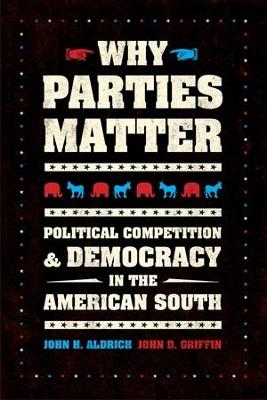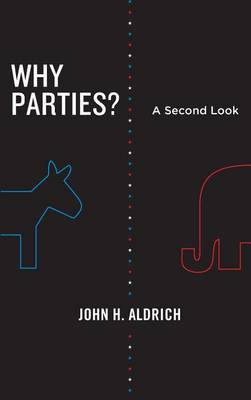Chicago Studies in American Politics
2 total works
Since the founding of the American Republic, the North and South have followed remarkably different paths of political development. Among the factors that have led to their divergence throughout much of history are differences in the levels of competition among the political parties. While the North has generally enjoyed a well-defined two-party system, the South has tended to have only weakly developed political parties and at times no system of parties to speak of. With Why Parties Matter, John H. Aldrich and John D. Griffin make a compelling case that competition between political parties is an essential component of a democracy that is responsive to its citizens and thus able to address their concerns. Tracing the history of the parties through four eras the Democratic-Whig party era that preceded the Civil War; the post-Reconstruction period; the Jim Crow era, when competition between the parties virtually disappeared; and the modern era Aldrich and Griffin show how and when competition emerged between the parties and the conditions under which it succeeded and failed.
In the modern era, as party competition in the South has come to be widely regarded as matching that of the North, the authors conclude by exploring the question of whether the South is poised to become a one-party system once again with the Republican party now dominant.
In the modern era, as party competition in the South has come to be widely regarded as matching that of the North, the authors conclude by exploring the question of whether the South is poised to become a one-party system once again with the Republican party now dominant.
Since its first appearance fifteen years ago, "Why Parties?" has been essential reading for anyone wishing to understand the nature of American political parties, but in the interim, the party system has undergone some radical changes. In this landmark book, now rewritten for the new millennium, John H. Aldrich goes beyond the clamor of arguments over whether American political parties are in resurgence or decline and undertakes a wholesale reexamination of the foundations of the American party system. Surveying critical episodes in the development of American political parties - from their formation in the 1790s to the Civil War - Aldrich shows how they address three fundamental problems of democracy: how to regulate the number of people seeking public office, how to mobilize voters, and how to achieve and maintain the majorities needed to accomplish goals once in office.
Aldrich brings this innovative account up to the present by looking at the profound changes in the character of political parties since World War II, especially in light of ongoing contemporary transformations, including the rise of the Republican Party in the South, and what those changes accomplish, such as the Affordable Care Act. Finally, "Why Parties?" offers a fuller consideration of party systems in general, especially the two-party system in the United States, and explains why it is necessary for effective democracy.
Aldrich brings this innovative account up to the present by looking at the profound changes in the character of political parties since World War II, especially in light of ongoing contemporary transformations, including the rise of the Republican Party in the South, and what those changes accomplish, such as the Affordable Care Act. Finally, "Why Parties?" offers a fuller consideration of party systems in general, especially the two-party system in the United States, and explains why it is necessary for effective democracy.

